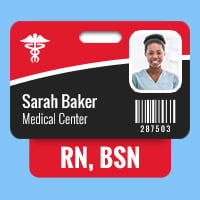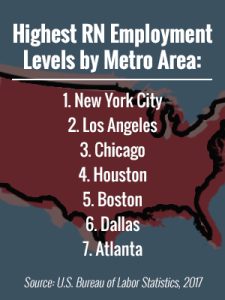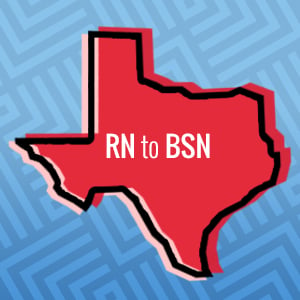Your RN to BSN Questions Answered

Are you a working nurse with a two-year nursing degree or diploma? You may have thought about earning a BSN, but it can seem daunting if you work full time and have a busy life outside your job. Take heart. Thanks to online degree programs, you can earn a BSN while you continue to work because these programs are designed with working nurses in mind. An RN to BSN program helps nurses develop critical thinking skills and evidence-based practice — important if you’re passionate about nursing and want to become better at it.
Here are answers to some questions you may have as you research online RN to BSN programs. Click on a link to jump to the section you want:What Is an RN to BSN Program?
An RN to BSN is a bridge to a bachelor’s degree in nursing for licensed registered nurses with a diploma, associate of science in nursing (ASN) or associate degree in nursing (ADN).
RN to BSN programs typically require an active, unencumbered nursing license for admission.
How Is an RN Different Than a BSN?

An RN can refer to a job, title, license or the person doing the job. A registered nurse can have different levels of education, including a bachelor’s degree. A BSN is a Bachelor of Science in Nursing; it is a college degree. A BSN also signifies increased in educational attainment.
If you’re an RN, you got there one of two ways:
1. You earned a two-year nursing degree or diploma and passed the National Council Licensure Examination (NCLEX).
If this is you, read on for insights and data on why earning a BSN is good for your career and earning potential. It’s possible for you to earn a BSN online even if you happen to be a full-time nurse and busy parent.
2. You earned a four-year Bachelor of Science in Nursing, and then passed the NCLEX.
If this describes you, congrats! You’ve done the hard work to earn a degree that more and more employers are requiring of nurses. Should you decide to go back to school for a master’s degree in nursing, your BSN will be your ticket to get in.
Why Should I Get a BSN?
The effort of earning BSN may seem daunting when coupled with your nursing shifts, so you might wonder why you should go back to school for this degree. It helps to think about your long-term prospects and earning potential. More immediately, why is earning a BSN a good idea?
- Potential for better jobs
With a BSN, you’ll have access to a wider variety of jobs and higher salaries. In metros like Dallas and Houston, which is home to Texas Medical Center, the largest medical complex in the world, the larger hospitals and healthcare systems — which tend to pay better — typically require a BSN at a minimum.More than eight in 10 employers strongly prefer BSN graduates, with 49 percent of hospitals and other healthcare facilities requiring nurses to have a BSN, according to the American Association of Colleges of Nursing. - Become a better nurse and find job satisfaction
BSN preparation correlates with better patient outcomes and lower mortality rates, according to AACN’s fact sheet on The Impact of Education on Nursing Practice. This correlation may help explain employer preference for BSN-prepared nurses.The fact sheet also points out that nurses prepared at the BSN level showed higher levels of job satisfaction. Think about it — the more prepared you are to do your job, the better you’ll be at it, and the happier you’ll be because you’re doing an awesome job.”I have a desire to have more knowledge just to be able to give better care to my patients, really. The more knowledge I have, the better the decisions I could make.” — Ashley Blanchard, online RN to BSN student in Lafayette, Louisiana - Lay the groundwork for graduate school.
If you’d like to earn a master’s or doctoral degree in nursing down the road, you’ll need a BSN to be considered for admission — something to think about if you see yourself in nursing leadership roles that require a master’s degree. Or if you plan on becoming a nurse educator, nursing administrator or a nurse practitioner, a bachelor’s degree is the first step.
What Will I Learn in an RN to BSN Program?
RN to BSN programs equip nurses with the knowledge, critical thinking skills and tools they’ll need to provide optimal care. Typical curricula include courses on community health, leadership, and evidence-based practice.
Lamar University’s three nursing practice courses are Care of Communities, Compromised Multiple Health States, and Leadership and Management. The RN to BSN online curriculum includes a course on evidence-based practice. The program’s non-traditional clinicals are research- and interview-based, which helps students enhance their understanding of family service programs. Most of these projects are completed in a community service setting, such as a local suicide crisis organization.
What Will I Learn in an RN to BSN Program?
RN to BSN programs equip nurses with the knowledge, critical thinking skills and tools they’ll need to provide optimal care. Typical curricula include courses on community health, leadership, and evidence-based practice.
Lamar University’s three nursing practice courses are Care of Communities, Compromised Multiple Health States, and Leadership and Management. The RN to BSN online curriculum includes a course on evidence-based practice. The program’s non-traditional clinicals are research- and interview-based, which helps students enhance their understanding of family service programs. Most of these projects are completed in a community service setting, such as a local suicide crisis organization.

Evidence-based practice is a big thing that I did not really focus on before I started taking these courses. And now whenever we have something come up at work, I will go and I will research it. And if I don’t agree with something they’re doing, I will be able to basically research it and present it with supporting facts as to why we shouldn’t be doing it that way or if I can make a suggestion to do it a different way and I’ll have actual documentation and studies to support the claim that I’m making.
—Ashley Blanchard,
online RN to BSN student in Lafayette, Louisiana
Why Is Accreditation Important?

Many reasons, the main ones being:
- If you choose a program that lacks accreditation, you may not qualify for financial aid.
- Healthcare employers prefer to hire graduates of accredited programs. Why is this so? A degree from an accredited program gives them confidence that the nurse’s preparation meets nationally recognized standards for nursing education.
- If you need to transfer to an accredited nursing school in the future, your credits from an unaccredited program may not count, or you may be denied admission altogether.
The two national agencies that accredit nursing programs are the Accreditation Commission for Education in Nursing (ACEN) and the Commission on Collegiate Nursing Education (CCNE).
Lamar University holds ACEN accreditation.
What Is the Job Outlook for Nurses?

Prospects are bright for nurses throughout the U.S. The number of job openings for nurses is expected to grow 15 percent between 2016 and 2026 — more than twice the rate for all occupations, according to the U.S. Bureau of Labor Statistics.
The job market is favorable for Texas nurses too — Houston and Dallas rank fourth and sixth on the BLS list of U.S. metro areas with the highest employment level for nurses. Further, Texas is second only to California for number of working nurses.
Can I Make More Money With a BSN?
As mentioned above in the “Why Should I Get a BSN” section, there is a strong demand for BSN-prepared RNs. For the most part, the increased salary prospects from earning a BSN are the additional roles you’ll qualify for. Depending on where you work, it’s possible you could get a raise for earning a BSN while continuing in your current role.
PayScale says BSN-prepared nurses make $12K more per year than ADN nurses. The difference can add up over time.
| Degree | Average Salary |
|---|---|
| ADN | $67,000/year |
| BSN | $79,000/year |
I Earned My ADN/ASN in Texas. How Can I Minimize Time and Cost for My BSN?

Find an RN to BSN program that dovetails with the associate degree program you graduated from so your credits will transfer more easily. You can save time and money by not having to repeat courses you’ve done before.
If you completed a state-approved pre-licensure program in Texas, you can expect a smooth transition into Lamar University’s online RN to BSN program.
How Much Do RN, BSNs Make in Texas?
Salaries vary by city, employer and job role. In Houston, RN, BSNs report making $80,889 per year, according to Glassdoor. This is about 5 percent above the national average. The same site shows Dallas RN, BSNs at the same rate as the national average at $76,670. In Austin, the average base pay is slightly lower at $69,812.
What Is the Cost of Online RN to BSN Programs?
A school’s location, accreditation and ranking are among several factors that affect tuition cost. Nonprofit (state) universities are typically more affordable than for-profit institutions.
As of November 2018, the for-profit University of Phoenix charges $398 per credit hour for its online RN to BSN program. You’re looking at $590 per credit hour at Chamberlain University, another for-profit institution. Western Governors University charges by the term, instead of by the credit hour, incentivizing students to finish faster.
Lamar University is part of the Texas State University System. With tuition at $278 per credit hour, the school’s online RN to BSN is one of the country’s most affordable programs. The total tuition for the 30-credit nursing curriculum is $8,340. This doesn’t include books, but there are no other add-on fees.
Tuition is the same for in-state and out-of-state students in Lamar University’s online RN to BSN program. You will not pay more if you live out of state.
Learn more about Lamar University tuition and financial aid options.
How Will I Pay for the Degree?
Deciding to earn a degree is a big step. Will you have time? How will you pay for it? When it comes to funds for your RN to BSN program, the following are options you can explore.
- Your Employer
Check first with the benefits department where you work to see if you can get help with tuition. Some healthcare employers offer full or partial tuition reimbursement. Become aware of any service contracts you’ll have to keep if you decide to take advantage of this benefit. - Federal/State Resources
You can complete the Free Application for Federal Student Aid (FAFSA) to be considered for a government loan. A benefit of filing your FAFSA is that you’re automatically considered for state-sponsored grants in addition to loans. - Scholarships and Grants
Another option for nursing students is HRSA’s NURSE Corps Scholarship Program. The program provides funding in exchange for a commitment to work at a Critical Shortage Facility (CSF) after graduation.
Johnson & Johnson’s scholarship database and the list of scholarships at Nurse.org are additional resources for nursing students.
Lamar University periodically offers tuition incentives for the online RN to BSN program. Call 866-223-7675 to learn about any current scholarship offers.
How Long Will It Take to Finish an Online RN to BSN Program?

It varies. It depends on how much of your general education (gen-ed) requirements you’ve finished when you enter the program. Examples of general education courses are English and statistics. Some students and schools refer to these courses as pre-requisites.
Most students who have already taken all of their gen-ed courses can complete the program in as few as 13 months. Those who haven’t completed these types of courses can take them concurrently with nursing courses through Lamar University’s online program. For this reason, they’re called co-requisites – unlike pre-requisites, you don’t have to have them all done before you start the online RN to BSN program.
Typically, the 13 month completion time includes a one-week break after each eight-week session so you can catch a breath between sessions!
And if you need to take general education courses or co-requisite courses, you can do those alongside the nursing courses. This can help speed up completion time.
How Many Hours Will I Need to Study Per Week?
Again, this varies widely. Here’s a formula to help you estimate study time for the Lamar University online RN to BSN:
Number of study hours per week = (Number of credit hours x 45)/(Length of session, in weeks)
Assuming a session length of eight weeks, you’re looking at 17 hours per week of study time for one course and 34 for two. Keep in mind that these are estimates. Your actual study time will vary based on your interest in a subject as well as your familiarity and comfort level. Your study time could be as little as 7-10 hours per week for a course you find easy.
Ashley Blanchard, an RN to BSN online student at LU, says she typically spends 24 hours a week on her coursework when taking two to three courses per term.
“I’m an overachiever, so I try to make A’s in everything, so I spend a lot of hours.” – Ashley Blanchard, online RN to BSN student in Lafayette, Louisiana
What Support Is Available to Military Members and Veterans?

Be sure to check with the universities you are considering about the types of support available to military members, veterans and dependents.
The GI Bill Transfer Program is an oft-overlooked benefit. If you are a spouse or dependent child of a military member, you may be able to apply their unused GI benefits toward your RN to BSN program.
Lamar University is military-friendly. Contact the university’s Veterans Affairs (VA) Office for assistance with education benefits. Under the Texas Hazlewood Exemption Act, qualified veterans, spouses and dependent children may be eligible for tuition exemption for up to 150 hours.
I’m a Working Nurse. Is an Online Program Right for Me?
The Lamar University RN to BSN online program is designed for working nurses. You can study when it’s most convenient for you. Being online, the learning modules are available 24/7. All you need is internet access.
Working nurses love the flexibility and convenience of the online format. They can fit the program into their busy lives rather than rearrange their time around on-campus classes and fixed schedules.
“I have three children, and I work. So it is very difficult to navigate a schedule to physically be in a program. Online gives me that opportunity to continue to go to school but still participate as a mother, as a wife, @and in my career.” — Ashley Blanchard, online RN to BSN student in Lafayette, Louisiana
Will I Be Able to Talk to My Professors?
Good online programs encourage two-way communication between students and professors. In this setup, you can reach out to instructors with questions about the course material or request accommodation for special situations. Online discussion boards and email are two ways for students to be in touch with their instructors.
Students receive three levels of support in Lamar University’s online RN to BSN:
1) Professors and instructional associates are all available to students via email or Blackboard, Lamar University’s learning management system (LMS).
2) An advisor assists students with their degree plan and provides guidance on the program’s academic requirements.
3) A specialist helps the student stay on top of assignments and deadlines through weekly check-ins. This extra level of personalized support helps students stay focused on their goal of completing the program.
Why Lamar University?
If you graduated from a state-approved pre-licensure program in Texas, you can easily transition into Lamar University’s online RN to BSN program.
Dallas County Community Colleges, Tarrant County Community Colleges, San Jacinto College (Houston), Houston Community Colleges and San Antonio College are a few examples of state-approved pre-licensure programs. As part of the Texas State University System, Lamar University articulates well with these programs. What does this mean for you as a student? You won’t have to spend time and money repeating courses you’ve done before. The result: You’ll graduate sooner at lower cost.
“I was already familiar with Lamar University from doing my LPN to RN degree at Lamar State College-Orange. So I found the least resistance with transferring all of my credits to Lamar University, being that I already got my degree from Lamar-Orange. I ran into a lot of issues at other universities with classes matching the curriculum. I would have to take a lot more classes elsewhere compared to Lamar University. Lamar University was more on track with Lamar-Orange and transferring my credits was easier.” — Ashley Blanchard, online RN to BSN student
Another advantage of the Lamar online RN to BSN is the continuity available for nurses who may ultimately want to earn an MSN. The university offers online MSN programs in nursing administration or nursing education. The continuity helps busy nurses earn an advanced degree in a familiar learning environment while being assured that their bachelor’s program and courses will be accepted toward the graduate program.
When Can I Start?
Lamar University offers start dates year round, so you don’t have to wait for a fall or spring start to begin. Once you apply and get your transcripts submitted, you can expect an admission decision in three to four weeks.
AACN: The Impact of Education on Nursing Practice
AACN: Employment of New Nurse Graduates and Employer Preferences for Baccalaureate-Prepared Nurses
U.S. BLS: Employment of Registered Nurses, by State, May 2017
PayScale: Associate Degree Nursing (ADN) Degree
PayScale: Bachelor of Science in Nursing (BSN) Degree

